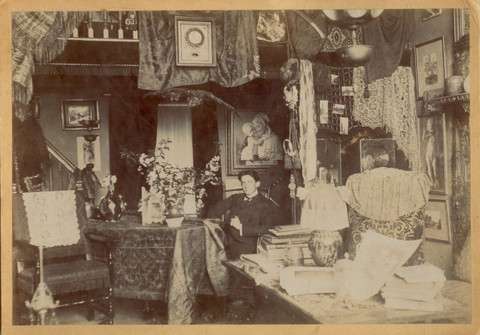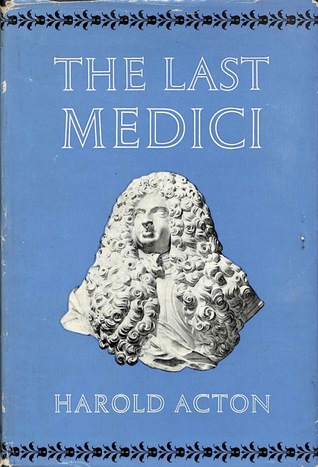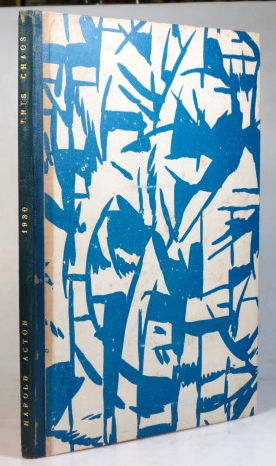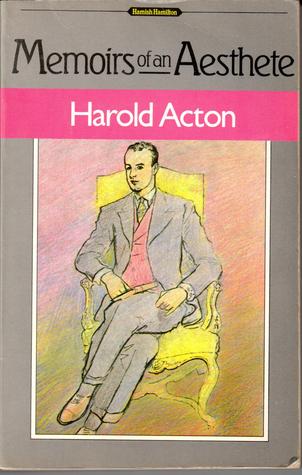Harold Acton - Muses & The Beau Monde
- Lilium

- Feb 19, 2020
- 4 min read

Sir Harold Mario Mitchell Acton, CBE, born 5 July 1904 was a British writer, scholar, and aesthete.
Acton was born to a prominent Anglo-Italian-American family of baronets, later raised to the peerage as Barons Acton of Aldenham at Villa La Pietra, near Florence, Italy. His father was the successful art collector and dealer Arthur Acton.

At Eton College, he became a founding member of the Eton Arts Society, and in his final years at school, eleven of his poems appeared in The Eton Candle, edited by his friend Brian Howard.
Among his contemporaries at Eton were Eric Blair (the writer George Orwell), Cyril Connolly, Robert Byron, Alec Douglas-Home, Ian Fleming, Brian Howard, Oliver Messel, Anthony Powell, Steven Runciman, and Henry Yorke (the novelist Henry Green).

He then went up to Oxford to read Modern Greats at Christ Church. He published his first book of poems, Aquarium (1923) and co-founded the avant garde magazine The Oxford Broom and mixed with many intellectual and literary figures of the age, including Evelyn Waugh, who based the character of Anthony Blanche in Brideshead Revisited partly on him.
It was from the balcony of his rooms in Meadow Buildings that he declaimed passages from The Waste Land through a megaphone (an episode recounted in Brideshead Revisited, through the character Anthony Blanche).

Acton was regarded as a leading figure of his day and would often receive more attention in memoirs of the period than men who were much more successful in later life; for example, the Welsh playwright Emlyn Williams described this encounter with Acton in his autobiography George (1961)
"Bowing with the courtesy of another age and clime, he spoke, an English flawlessly italianated. 'I do most dreadfully beg your pardons this inclement night – though I have been resident a year, I find it too idiotically difficult to find my way about, I have been round Tom (tower) like a tee-toe-tum, too too madd-ening – where does our dear Dean hang out?' He thanked me profusely, raised the bowler with a dazzling smile, and propelled himself Deanward, an Oriental diplomat off to leave a jewelled carte de visite (a calling card). 'Jesus,' said Evvers, 'what's that?' 'He's the Oxford aesthete,' I informed him, 'a Victorian, his rooms in Meadow are in lemon yellow and he stands on his balcony and reads his poems through a megaphone to people passing, and he belongs to the Hypocrites' Club with Brian Howard and Robert Byron and Evelyn Waugh and all that set, they call themselves the Post-War Generation and wear Hearts on their lapels as opposed to the pre-war Rupert Brooke lot who called themselves Souls."
Williams also described Acton's review of The Picture of Dorian Gray in the Oxford student newspaper Cherwell:
"a charming boy's book, we would suggest a cheap edition to fit comfortably into the pocket of a school blazer"; and summarised Acton's modernist approach to literature: "But if one finds the words, my dears, there is beauty in a black-pudding."
Acton was also part of the Railway Club which he dominated.

In 1926 Acton acted as a special constable during the general strike, apolitical as he was, and took his degree. In October he took an apartment in Paris, at 29 Quai de Bourbon, and had his portrait painted by Pavel Tchelitchew.

Moving between Paris and London in the next few years, Acton sought to find his voice as a writer. In 1927 he began work on a novel, and a third book of poems, Five Saints and an Appendix, came out early the following year. This was followed by a prose fable, Cornelian, in March. In July Acton acted as Best Man at the wedding of Evelyn Waugh to the Honourable Evelyn Gardner. Waugh's Decline and Fall bore a dedication to Acton 'in Homage and Affection', but when Acton's own novel – disastrously entitled Humdrum – appeared in October 1928, it was slated in comparison with Decline and Fall by critics such as Cyril Connolly.
“So often is the virgin sheet of paper more real than what one has to say, and so often one regrets having marred it.”
― Harold Acton
In the later 1920s Harold frequented the London salon of Lady Cunard, where at various times he encountered Ezra Pound, Joseph Duveen and the Irish novelist George Moore. On visits to Florence he cemented his friendship with Norman Douglas, who wrote an introduction to Acton's translation of a lubricious 18th-century memoir of Giangastone de' Medici, The Last of the Medici, privately printed in Florence in 1930 as part of the Lungarno Series. A fourth collection of poems, This Chaos, was published in Paris by Acton's friend Nancy Cunard, though the Giangastone translation pointed in a more promising direction. History was indeed to prove far more congenial to Acton than poetry.
One close observer, Alan Pryce-Jones, felt that life in Florence weighed upon Acton with its triviality, for, like his father, he was a hard worker and a careful scholar. The East was an escape. He took up residence in Peking, as Beijing was then known, which he found congenial. He studied Chinese language, traditional drama, and poetry.
The Second Sino-Japanese War broke out in 1937, but Acton did not leave until 1939, when he returned to England and joined the Royal Air Force as a liaison officer. He served in India and what was then Ceylon, and then after the Liberation in Paris. When the war was over, he returned to Florence. La Pietra had been occupied by German soldiers, but he expeditiously restored it to its proper glory.

Acton died 27 February 1994 (aged 89) at Villa La Pietra
After Acton's death, in reply to a magazine article that speculated both about the probable suicide of Acton's brother and about Acton's homosexuality, author A. N. Wilson remarked, "To call him homosexual would be to misunderstand the whole essence of his being" and that "He was more asexual than anything else".
“Some people take no mental exercise apart from jumping to conclusions.”
― Harold Acton
The article, by American writer David Plante, described Acton's time at Oxford as a "virile aesthete-dandy," but noted that while in China during the 1930s Acton's predilection for boys led to a classified government document describing him as a "scandalous debauchee," and prevented the possibility of his serving in the intelligence services there, when war broke out. Plante also described the young men whom Acton welcomed to La Pietra, including Alexander Zielcke, a German photographer and artist who was Acton's lover for the last twenty-five years of his life.
Reading Recommendations & Content Considerations
by by
Harold Acton Harold Acton























Comentários